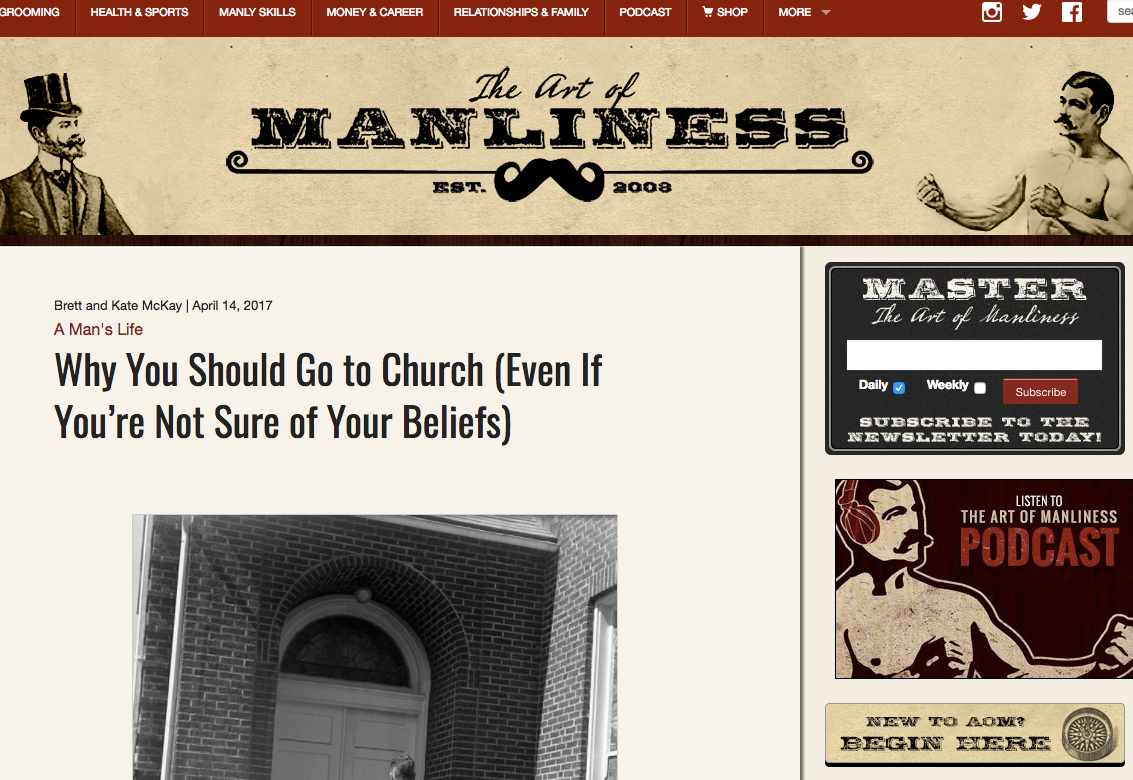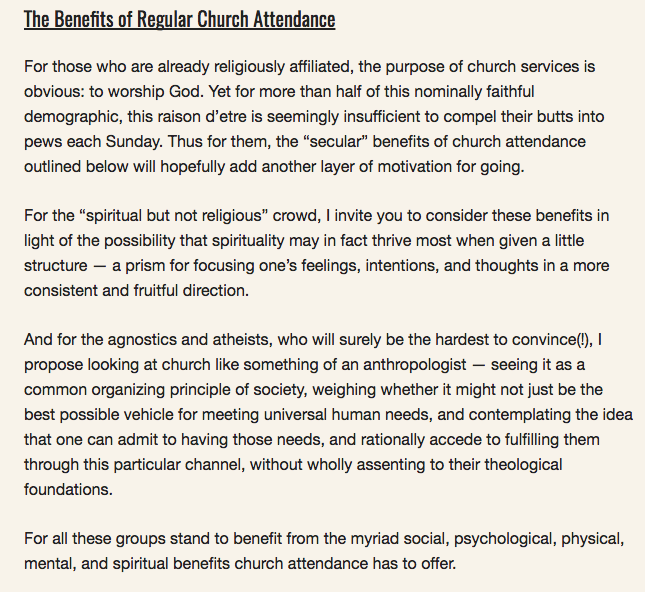April 17, 2017
When the agnostics are telling us to go to church, something’s up
When the agnostics are telling us to go to church, something’s up. When the secular writers are starting to express concern at how the loss of any coherent narrative is fracturing our culture, then we know the post-Christian thing is starting to bite.
It’s been interesting this Easter watching secular and public writers start to play catch up with what Western apologetics has been saying for decades: that the modern liberal state will not be able to withstand the removal of its unacknowledged Christian foundations.
Modern Christian apologetics has been saying to anyone who would listen (usually the converted faithful), that you can’t pull the foundations out from under a building without risking the building. Yet the liberal mindset has been merrily ignoring this, assuming it can have the fruit of the gospel without the root of the gospel that grew that fruit.
And the sense among the secular writers is one of growing concern. I suppose many a Christian apologist who was scorned for pointing this out for so long would be forgiven for having a sense of Schadenfreude, were the stakes not so high.
So imagine my intritue as I watch a plethora of online and hard copy articles this holy weekend expressing alarm at how quickly the sociological building is crumbling, and all of this despite the brisk confidence of those who are undermining it.
Articles addressing this concern range from Paul Kelly’s extended piece in The Australian newspaper entitled A New Secularism Thrashes Tradition, through to a piece in The Times from the UK by the avowedly secular Douglas Murray, We May Not Believe But Let’s Go To Church Today.
The latter article in particular seems to be picking up its cues from the surprise rise in orthodox Catholic Church attendance in that most secular of all states, France. And among a younger crowd too.
And then there is the solidly progressive New York Times publishing the solidly conservative Catholic Ross Douthat’s piece called Save the Mainline, in which he states:
For the sake of their country, their culture and their very selves, liberal post-Protestants should find a mainline congregation and starting attending every week.
Heady stuff indeed. Mind you Douthat goes on to point out that most liberal post-Protestants don’t bother to turn out of bed of a Sunday to go to church because: some of what those congregations offer is already embodied in liberal politics and culture.
Some? I’d say most. After all even I wouldn’t get out of bed on a Sunday morning if all that was on offer was what I could read in The New York Times already, save for the crunchy bits like Douthat’s, which would never make it past the baptismal font at the back.
Even that famously unreconstructed man’s man website artofmanliness.com had this on its front page on Saturday:

After you’ve been to the bare knuckled boxing the night before that is.
And what manly arts does church attendance foster? Well the rationales were aplenty:

I’m not sure manly man’s raisons d’etre do it for me, but being the bare knuckled man he is, he’s got the killer punch line: “seeing [church] as a common organising principle of society.”
That’s the common concern among the articles doing the rounds this Easter. Simply put: there is no longer any organising principle around society. Liberal secular frameworks simply cannot, and are not, containing the weight of a culture because, as we have said, they have steadily and gleefully been removing the foundations, but are helpless at knowing how to replace them, or at least doing so without serious state coercion. They haven’t reached the point of full coercion yet, because they’re too still a little too squeamish about full state power. So far anyway.
It’s naive to think that some vague notion of universal human rights can remotely do that when there is no “universal” to build it upon. It’s sheer stupid to think about equality outside the sense of being “created” equal. Yet the secular progressive agenda thinks if it can just have another crack at it, with minimal blood letting of course, it might manage to triumph. And if that doesn’t work, hey, let’s redefine the word “minimal”.
The Australian’s Kelly puts it best when he says “the upshot is a society in confusion and dispute over the meaning of virtue.”
Christian writers and thinkers who have dismissed their fellow believers’ concerns about this matter, calling it a false narrative of decline, have to ask themselves why the secular writers are suddenly cottoning on to this trend, and doing so in a slightly panicked manner. Secular writers are suddenly looking to Christian thinkers for answers about this. We’d better have something to answer them, and it better be more than a baptised version of what the Humanities Departments of every Western university has been shoving down our throats for decades.
All too often Christians are either guilty of dismissing such concerns about our world and culture. Or, on the other hand, we’re too busy assimilating to – and therefore being assimilated by -, the new virtues posited to us by the secular frame. Surely we’re at a point where we can start to agree with the concerns of secular writers such as Kelly and Murray, and point them in a good direction.
Bt here’s the rub. That direction must be in the direction of a return to the historical realities of the Christian faith itself; Incarnation, Life, Death. Resurrection, Ascension, Return. The mainlines have collapsed because the progressive liberal frame they preach merely filled the vacuum left behind when they abandoned the faith once delivered to the saints. We need to point out to sympathetic secularists that you can’t have the fruit of the traditions without the faith of the traditions.
That gospel story claimed a totalising ownership of the idea of virtue that swept all else away with through its sheer historical weightiness. The scorning claims of those who say we have rejected all of the abstract gods bar the last one, fail to see how this last great God swept away the brute power, pride and position of those false gods, leaving Him alone to stand as the Colossus of history.
The unity of the church is the unity of the Spirit that we maintain – a gift given to us; it is not a unity we attain through effort, including going to church for cultural reasons. The hopes of many well-meaning secularists will be dashed if they think church attendance is a panacea.
And now the misplaced confidence of the neo-pagan secular frame assumes it can operate in a vacuum of gods, never realising the immanent danger of restoring the old gods to the throne should they reject the resurrected Easter King. For the old gods require the blood of their followers, an anti-Easter message in which we are killed and entombed for their sakes, not the other way around.
The secular writers and thinkers are right to be concerned. We should welcome the fact that they suddenly been shocked into action. But their call to return to traditions purely for pragmatic reasons, and their suggestion that we should all somehow go back to church because it’s a great organising principle for society, will fall on deaf ears, and simply enrage their opponents all the more, without a commitment to the historical reality of the faith.
Dry Tradition and self-serving pragmatism got us into this bind in the first place. It’s certainly not going to get us out of it.
Written by
There is no guarantee that Jesus will return in our desired timeframe. Yet we have no reason to be anxious, because even if the timeframe is not guaranteed, the outcome is! We don’t have to waste energy being anxious; we can put it to better use.
Stephen McAlpine – futureproof
Stay in the know
Receive content updates, new blog articles and upcoming events all to your inbox.


